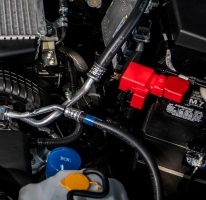— A Subaru battery class action has survived a motion to dismiss the lawsuit that alleges the batteries drain in 2015-2020 Outback, 2015-2020 Forester, 2015-2020 Legacy, 2015-2020 WRX and 2019-2020 Ascent vehicles.
However, numerous claims were dismissed, including the nationwide Magnuson-Moss Warranty Act claim.
The Subaru battery class action lawsuit alleges the vehicles cannot be operated when the batteries drain due to the controller area networks (CANs).
When the vehicle is in use, the CAN system relies on electrical current so the vehicle can be operated. When the vehicle is off, the CAN system should enter a sleep mode in which it stops drawing significant electrical current.
But the Subaru battery lawsuit alleges the CANs in the vehicles fail to enter sleep mode when the vehicles are off, causing parasitic battery drain. The plaintiffs claim software errors prevent the systems from entering sleep mode.
Replacing the battery allegedly does no good because the replacement battery also drains and results in useless vehicles.
The battery class action lawsuit alleges Subaru knew about the problem in 2014 but did not inform customers and instead actively concealed the alleged defect.
The plaintiffs also refer to several technical service bulletins (TSBs) Subaru issued as early as June 2014 which discuss technical problems including rapid battery drain.
The Subaru battery class action was consolidated from several lawsuits, including Dalen v. Subaru and Tomasian v. Subaru.
Subaru Battery Class Action Lawsuit (Order by Judge)
Multiple claims against Subaru were dismissed, including all claims related to Subaru Forester and Legacy vehicles.
The 13 plaintiffs sued by alleging 2015-2020 Subaru Forester and the 2020 Subaru Legacy vehicles were defective due to the battery drain issues. But Subaru argues those vehicles cannot be included in the battery class action lawsuit because none of the plaintiffs owned or leased Foresters or Legacys.
The judge agreed and ruled none of the plaintiffs could have been harmed by a Subaru model they never owned or leased.
In its motion to dismiss, Subaru also argues all express warranty claims should be dismissed because the warranty covers "defective materials or workmanship," not design defects. Subaru told the judge the allegations made by the plaintiffs relate to design defects which are not covered by the warranty.
But Judge Joseph H. Rodriguez ruled he must construe allegations against Subaru in favor of the plaintiffs at this stage. According to the judge, "the Court cannot decide as a matter of law that these 'software errors' result from a design defect rather than an error in implementing an otherwise functional design."
However, the judge did dismiss some express warranty claims because some of the plaintiffs do not allege their vehicles continued to have problems once Subaru made repairs.
Common-law and statutory fraud claims were also dismissed to the extent the plaintiffs have alleged affirmative fraudulent misrepresentations.
But the judge denied to dismiss statutory fraud and fraudulent concealment claims for lack of knowledge.
According to the Subaru battery class action lawsuit order, the judge dismissed claims for unjust enrichment, and the nationwide Magnuson-Moss Warranty Act claim is dismissed because the plaintiffs didn't name 100 plaintiffs, as the statute requires.
The Subaru battery class action lawsuit was filed in the U.S. District Court for the District of New Jersey: In re Subaru Battery Drain Products Liability Litigation.

